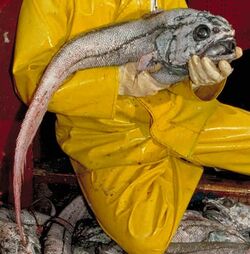Biology:Giant grenadier
| Giant grenadier | |
|---|---|

| |
| Scientific classification | |
| Domain: | Eukaryota |
| Kingdom: | Animalia |
| Phylum: | Chordata |
| Class: | Actinopterygii |
| Order: | Gadiformes |
| Family: | Macrouridae |
| Subfamily: | Macrourinae |
| Genus: | Albatrossia Jordan & Gilbert, 1898 |
| Species: | A. pectoralis
|
| Binomial name | |
| Albatrossia pectoralis (Gilbert, 1892)[1]
| |
| Synonyms[1] | |
| |
The giant grenadier, Albatrossia pectoralis, is a very large rattail, and the only member of the genus Albatrossia. It is found in the north Pacific from northern Japan to the Okhotsk and Bering Seas, east to the Gulf of Alaska, and south to northern Baja California in Mexico. It is found at depths between 140 and 3,500 m. It can grow up to 2.1 m in length. The giant grenadier has the usual greatly elongated, pointed tail of the rattails.
Ecology
Giant grenadiers are apex predators on the upper continental slopes of the northern Pacific. Their main prey are Octopoteuthis deletron squid and Vampyroteuthis infernalis vampire squid.[2]
Because of their great abundance, several attempts have been made to develop a fishery for giant grenadier. However, the fish is categorized as “unpalatable” because of its soft texture, high moisture content, and low protein content.[3]
References
- ↑ Jump up to: 1.0 1.1 Froese, Rainer and Pauly, Daniel, eds. (2018). "Albatrossia pectoralis" in FishBase. February 2018 version.
- ↑ Drazen, Jeffrey C; Buckley, Troy W; Hoff, Gerald R (2001). "The feeding habits of slope dwelling macrourid fishes in the eastern North Pacific". Deep-Sea Research Part I: Oceanographic Research Papers 48 (3): 909–935. doi:10.1016/S0967-0637(00)00058-3.
- ↑ "The Abundant—But Not So Tasty—Giant Grenadier". NOAA Fisheries. http://www.nmfs.noaa.gov/stories/2014/01/1_13_14giant_grenadiers.html. Retrieved 5 January 2017.
External links
- Giant Grenadier – More info about the Giant Grenadier
Wikidata ☰ Q2664256 entry

